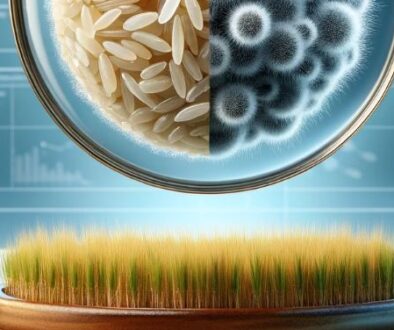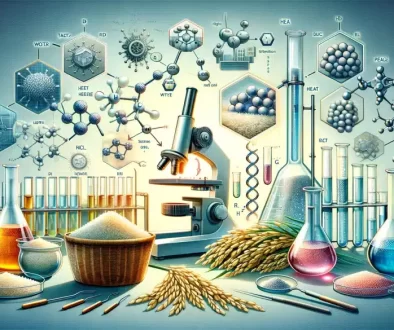Optimization of DH value of rice protein
Explore the optimization of rice protein hydrolysis for enhanced peptide production, focusing on enzymatic methods, temperature, and enzyme dosage for maximum efficiency.
Keywords: broken rice,starch sugar,bioactive peptide,rice peptide,rice protein,liver
protection
Introduction
Proteins can be hydrolyzed by acid, alkali, and enzymatic methods. Acid and alkali methods can completely hydrolyze proteins but may damage amino acids, reducing nutritional value. Enzymatic hydrolysis, while not as complete, operates under milder conditions, preserving bioactivity and is often used for peptide production. Peptide products, having better solubility and digestibility compared to less soluble rice protein, offer many advantages. Rice protein peptides are prepared mainly through enzymatic hydrolysis and microbial fermentation, with enzymatic methods being more mature and widely applied. Degree of hydrolysis (DH) measurement methods include TCA, ninhydrin, pH-stat, and formal titration methods. It was found that after secondary enzymatic hydrolysis, protein content in the retentate was around 65%-70%, with starch utilization reaching 90%-95%. To fully utilize protein resources, the retentate was subjected to enzymatic hydrolysis to obtain crude peptide products. This chapter optimizes rice protein hydrolysis focusing on enzyme type, time, temperature, and enzyme dosage through single-factor and response surface methodology (RSM) experiments, laying the foundation for subsequent active peptide research.
Research Methods
DH Value Measurement
After secondary enzymatic hydrolysis, 5 mL of retentate was used for pre-hydrolysis protein content measurement. Post-enzymatic hydrolysis, the solution was filtered through a 0.1 μm hollow fiber membrane to measure peptide content in the filtrate, with DH value being the ratio of post-hydrolysis peptide to pre-hydrolysis protein content.
Single-Factor Optimization
- Effect of Enzyme Type on DH Value: Various enzymes were tested for their effect on DH, showing alkaline protease had the highest hydrolysis degree, significantly higher than other enzymes.
- Effect of Enzyme Dosage on DH Value: Increasing enzyme dosage initially increased DH value but plateaued, indicating an optimal enzyme concentration.
- Effect of Hydrolysis Time on DH Value: DH value increased with time but plateaued after a certain period, suggesting an optimal hydrolysis duration.
- Effect of Hydrolysis Temperature on DH Value: DH value increased with temperature up to a point before decreasing, identifying an optimal temperature for enzymatic activity.
Response Surface Optimization
Based on single-factor experiments, temperature, time, and enzyme dosage were chosen as variables for RSM. The optimization aimed to refine conditions for the highest DH value. The model indicated a good fit and significant effects of these factors on DH value. The optimal conditions determined were a temperature of 58.4°C, time of 6.9 hours, and enzyme dosage of 0.29%, achieving a DH value of 44.97%. Validation under these conditions confirmed the effectiveness of the optimized process.
Results and Discussion
The study’s results showed that the type of protease, enzyme dosage, hydrolysis time, and temperature significantly affect the DH value, with alkaline protease and specific conditions leading to the highest hydrolysis degree. The response surface optimization provided a validated model for achieving an optimal DH value, important for the production of rice peptides with high activity.
Conclusion
This research, through enzymatic hydrolysis optimization, significantly contributes to the development of high-quality rice peptides. Single-factor and RSM experiments established a robust process for maximizing the DH value, with the findings serving as a reliable guide for producing active rice peptides. The optimized conditions offer a practical approach to enhancing the utilization of rice protein for peptide production, supporting further applications in food and nutraceuticals.
For more further detailed information of this research, feel free to contact our team for asssistance.
Original authors: Li Yinghui, Yuan Wenpeng (Qilu University of Technology, Jinan, 250353)
About ETprotein:
ETprotein, a reputable rice protein Chinese factory manufacturer and supplier, is renowned for producing, stocking, exporting, and delivering the highest quality organic bulk vegan protein and plant proteins. They include Organic rice protein, clear rice protein, pea protein, clear pea protein, pumpkin seed protein, sunflower seed protein, mung bean protein, etc. Our offerings, characterized by a neutral taste, non-GMO, allergen-free attributes, cater to a diverse range of industries. We serve nutraceutical, pharmaceutical, cosmeceutical, veterinary, as well as food and beverage finished product distributors, traders, and manufacturers across Europe, USA, Canada, Australia, Thailand, Japan, Korea, Brazil, and Chile, among others.
Our specialization includes exporting and delivering tailor-made protein powder and finished nutritional supplements. Our extensive product range covers sectors like Food and Beverage, Sports Nutrition, Weight Management, Dietary Supplements, Health and Wellness Products, and Infant Formula, ensuring comprehensive solutions to meet all your protein needs.
As a trusted company by leading global food and beverage brands and Fortune 500 companies, ETprotein reinforces China’s reputation in the global arena. For more information or to sample our products, please contact us and email sales(at)ETprotein.com today.












